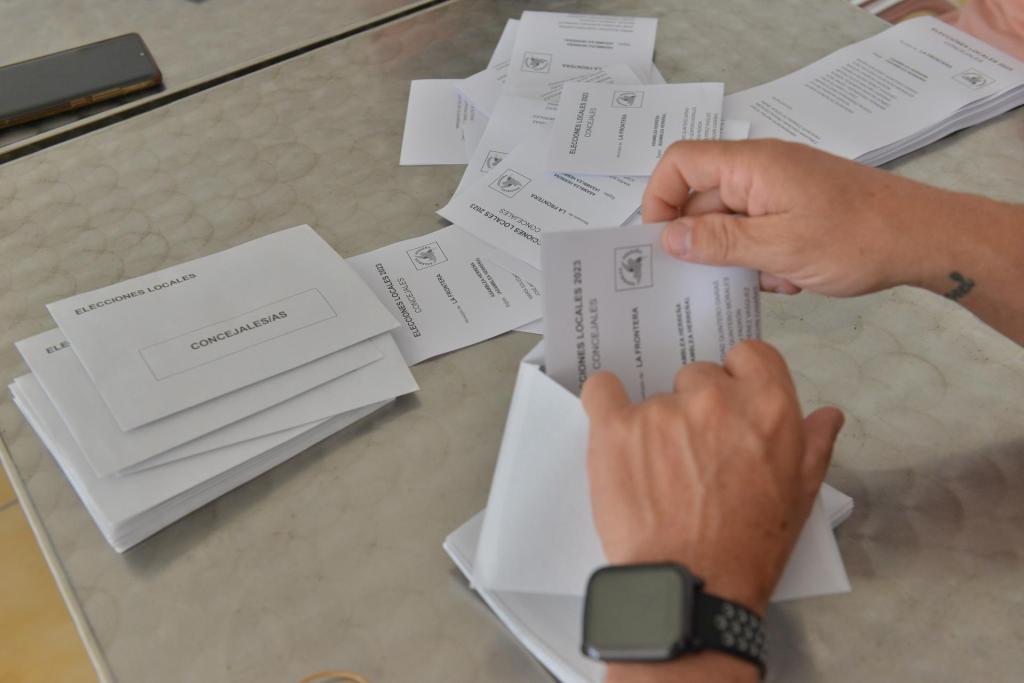Madrid (EFE). The campaign for the municipal and regional elections on May 28 ends with an increase in voting by mail, which has come under suspicion due to several cases of alleged fraud and, especially, after the Anti-Corruption Prosecutor’s Office has decided to investigate the plot of Melilla in which he appreciates the intention to “alter the free manifestation of the popular will.”
More than 984,000 are the citizens who have deposited their vote in the Post Office -6.4 percent more than in 2019-, with Madrid in the lead with 169,763, while the community that has registered the least has been Soria, with 3,090; In Melilla, 5,814 votes have been delivered to the Post Office, out of the 11,707 requested.
Politicians ask for the vote
In this environment and a few hours after the end of the electoral campaign, the politicians participate in the last rallies to ask for the vote before the day of reflection and on electoral Sunday, with the President of the Government and General Secretary of the PSOE, Pedro Sánchez, in Barcelona this afternoon, and the leader of the opposition, Alberto Núñez Feijóo, in Madrid.
At noon Sánchez has accused the Popular Party of “muddying” politics with the purpose of demobilizing voters and for this reason he has asked to vote “en masse for the PSOE” in these elections, without making any allusion to the cases of possible vote buying in places like Melilla, Mojácar (Almería) or Albudeite (Murcia).

Meanwhile, Feijóo has also called to vote “massively” on Sunday “against those who want to win with deception and cheating” and so that “sanchismo” finds out that “democracy is not for sale” in the face of the scandal of the vote buying that has affected several local PSOE candidates.
Precisely this Friday, the closing ceremony of the PSOE campaign in Maracena (Granada) has been cancelled, in which the intervention of the Secretary of Organization of the PSOE of Andalusia, Noel López, and the mayoress of this municipality, Berta Linares, was scheduled this afternoon. , for being allegedly involved in the kidnapping of the mayor Vanessa Romero.
From Ciudadanos, its spokesperson in Congress, Inés Arrimadas, has accused both parties, PSOE and PP, of only thinking about the color that will dye the different municipalities and autonomous communities that are holding elections this 28M. “They are only thinking about whether to paint themselves blue or red,” Arrimadas has reproached.
Anti-Corruption Takes Over Investigation
One of the main issues that has taken over the electoral campaign has been the purchase of votes, which jumped as a result of the theft of 43 electoral documents in Melilla when the postmen took them to the respective voters.
Shortly after, information emerged about a possible purchase of votes and the Electoral Board of the Melilla Zone agreed that the post office of the autonomous city would require the voter’s personal identification by means of a valid document when he sent his ballots.
Since then, there have been complaints about the buying of votes in different parts of the territory, where thirteen arrests have been added to the alleged plot in Melilla and Mojácar in Albudeite (Murcia) and complaints in La Gomera, Zamora, Almería, Murcia, Huelva and Alicante.
28M: What’s at stake
The municipal and regional elections are held this May 28 in Spain and their result will also have a national reading, since they are a kind of preview of the general ones scheduled just before the end of the year.
The elections will test whether or not there is wear and tear for the PSOE, in the central government since June 2018; the ability of a PP with a new leader (Alberto Núñez Feijóo) to recover votes; the validity of the Vox project; and the impact on Podemos of being a member of the Coalition Executive.
Among the unknowns of the autonomous regions, Madrid stands out, where Isabel Díaz Ayuso could even achieve an absolute majority according to the polls, and the Valencian Community, with Ximo Puig in the fight to maintain the Generalitat for one more legislature.

In the municipal elections, the Madrid City Council is in dispute according to the polls, while in Barcelona Ada Colau is fighting for victory with the socialist Jaume Collboni. The fight for the mayoralty of Valencia also seems competitive, until now in the hands of Compromís with Joan Ribó at the helm.
Twelve communities called to the polls
A dozen autonomies are called to the polls for this 28M: Aragon, Asturias, the Balearic Islands, the Canary Islands, Cantabria, Castilla-La Mancha, the Valencian Community, Extremadura, La Rioja, Madrid, Murcia and Navarra, in addition to the autonomous cities of Ceuta and Melilla. Andalusia, Castilla y León, Catalonia, Galicia and the Basque Country did not attend on this occasion.
The CIS pre-election survey for 28M, released on May 11, predicted a very open scenario, although it suggested that the PSOE could retain its main regional strongholds, such as the Valencian Community, Castilla-La Mancha and Extremadura, while placing the Madrid president, Isabel Díaz Ayuso, on the verge of an absolute majority.
The survey carried out by the Center for Sociological Research granted wide ranges in its estimates of seats that give disparate results and the possibility of pacts of different signs in many territories and municipalities.
The survey also gave the PSOE victory in the next municipal elections with 31.7 percent of the votes in the national total compared to 27.3 percent for the PP, a difference of 4.4 points.






